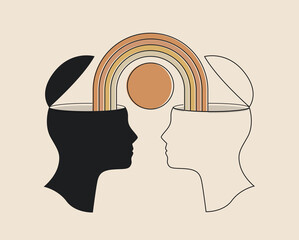Emotional intelligence is a crucial aspect of successful and fulfilling relationships. It involves the ability to understand and manage our own emotions, as well as empathize with and respond to the emotions of our partners. By developing emotional intelligence, we can foster deeper connections, enhance communication, and create a foundation of trust and understanding. In this article, we will explore the importance of emotional intelligence in relationships and provide practical tips for cultivating it.
- What is Emotional Intelligence?
Emotional intelligence refers to the ability to recognize, understand, and manage our own emotions and the emotions of others. It involves being aware of our feelings, expressing them appropriately, and effectively navigating emotional experiences. Emotional intelligence also encompasses empathy, which is the capacity to understand and share the emotions of our partners. - Developing Self-Awareness
The first step in cultivating emotional intelligence is developing self-awareness. Take time to reflect on your own emotions, triggers, and patterns of behavior. Understand how your emotions influence your thoughts and actions. By being aware of your own emotional landscape, you can better manage and express your feelings in a healthy and constructive manner. - Practicing Empathy
Empathy is a cornerstone of emotional intelligence. Put yourself in your partner’s shoes and try to understand their emotions and perspective. Actively listen to them without judgment and validate their feelings. Show genuine care and support. By practicing empathy, you create a safe and understanding space that nurtures emotional connection. - Effective Communication
Emotional intelligence enhances communication within relationships. Use “I” statements to express your emotions and needs, rather than blaming or criticizing your partner. Be an active listener and pay attention not only to their words but also to their nonverbal cues and emotions. Respond with empathy and validate their feelings. Effective communication built on emotional intelligence strengthens trust and fosters a deeper connection. - Emotional Regulation
Developing emotional intelligence involves learning how to regulate and manage your own emotions. This includes recognizing and labeling your emotions, understanding their underlying causes, and finding healthy ways to cope with them. Practice self-care, such as engaging in activities that bring you joy and relaxation. By managing your emotions, you can respond to relationship challenges in a calmer and more constructive manner. - Conflict Resolution
Emotional intelligence plays a significant role in conflict resolution. During disagreements, remain mindful of your emotions and those of your partner. Avoid reactive responses and instead strive for a calm and respectful dialogue. Seek to understand each other’s perspectives and find solutions that meet both of your needs. Emotional intelligence allows for more effective problem-solving and promotes relationship growth. - Building Trust and Intimacy
Emotional intelligence is closely tied to trust and intimacy. By being emotionally attuned to your partner, you create an environment of safety and understanding. Share your vulnerabilities and emotions with each other, and encourage your partner to do the same. This vulnerability fosters deeper emotional connection and strengthens the bond between you. - Continuous Growth and Learning
Cultivating emotional intelligence is an ongoing process. Be open to learning and growing within your relationship. Seek feedback from your partner and be willing to make adjustments. Embrace personal development activities, such as reading books on emotional intelligence or attending workshops. The more you invest in developing your emotional intelligence, the more rewarding your relationship will become.
Emotional intelligence is a vital skill for creating fulfilling and harmonious relationships. By cultivating self-awareness, practicing empathy, and effectively managing emotions, we can foster deeper connections, effective communication, and lasting happiness. Embrace emotional intelligence as an essential aspect of your relationship journey, and witness the transformative power it brings to your connection with your partner.










